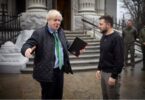Stephen Bryen
What does Russia want from Ukra-ine? This is one of the vital questions surrounding Russia’s growing buildup of military hardware and troops, both facing eastern Ukra-ine and from Crimea. No one seems to be asking Putin any questions, but rather are just demanding that he pull his troops back and relieve the military pressure. Nor is it clear if anyone is in a position to ask that question.
The Biden administration has dug itself into a hole by slapping on new sanctions and kicking out Russian diplomats. The Russians have tried to do tit for tat. So, too, have the Europeans got themselves into a tight mess. German Chancellor Angela Merkle has called for the Russians to pull out their troops, the EU is upset and the British and French are not far behind in offering condemnations.
None of this sets the stage for any meaningful dialogue. Even President Joe Biden, who called President Putin and suggested a summit meeting, has badly harmed his effort by slapping on more sanctions and crying fire. The Russians are not amused. While kicking out American diplomats and barring others from visiting Russia, a Russian Foreign Ministry functionary, Yuri Ushakov, “suggested” to the US Ambassador in Russia, John Sullivan, that he might leave Moscow and take a plane to Washington.
Sullivan demurred and said something about staying in Moscow until hell froze over, but the next day he went home to see his family and meet with the Biden team on what the State Department calls a “short visit.” Steadfastness is apparently not a quality admired in the Biden administration. But major parts of the Biden team are not yet even in place, and even if they are operating behind the scenes advising the president and the secretary of state, there is reason to be dubious.
One of them, Victoria Nuland, a former Barack Obama administration official who got caught interfering in Ukrainian politics when her mobile phone was intercepted by the Russians, is slated to be the third-highest ranking official at the State Department. She will have a lot to say about Ukraine and the best one can say about Nuland’s outlook is that she hates the Russians. Not much to cheer for if you are looking for negotiation, but a great team member if you want to go to war with Russia.
But it gets worse. Biden planned to bring on board a very senior specialist on Russia, Matthew Rojansky, who heads the Kenan Institute at the Washington-based prestigious Wilson Center. But Rojansky, who was accused of being “soft” on Russia, was unceremoniously dropped from consideration after outcries from the anti-Russia mafia in Washington and from the anti-Russian Ukrainian political community in the US.
This leaves Biden with a group of advisers who are anti-Russia and who would rather get into a firefight with Moscow than make any deals with Putin, who Biden calls a “killer.” The situation in Europe is not much better. The Alexei Navalny affair hangs over Europe as much as it is a noose around Putin’s neck. Will the Europeans decide to push for a war to support Navalny?
While it may sound ridiculous, unlike the Russian president who runs in pseudo-elections (where opponents are best not heard from or they go the way of Navalny), Europe’s current crop of leaders is all under a lot of pressure at home.
In Germany, the Green Party is gaining significant ground and may be able to choose the next chancellor when Merkel retires this year. The Greens also may go out to kill the Nordstream 2 pipeline on environmental grounds, which will be a blow to Russia and its designs of exporting more gas to Europe.
In France, Emmanuel Macron is about as popular as rotten Swiss cheese and survives only because there is fear in France of a right-wing government that renders Macron marginally acceptable. Italy has no real government, which does not matter in the European scheme of things anyway. Italy is looked down on by northern Europeans.
The UK is out of the game because it is out of Europe. The absence of the UK may be good luck for Boris Johnson and the Tory party. Britain played no role in the now largely violated Minsk Accords. Cobbled together in 2015, the deal includes Russia, Ukraine, France and Germany with the OSCE acting as overseer. This leaves the vacuous EU — an organization that has managed to turn Covid-19 vaccines from a godsend to an unmitigated disaster. The EU never stops its self-destruction.
Finally, there is China but it wants to stay aligned with Russia, so the chance of Beijing acting as a broker seems a big reach. This sorry state of affairs may cause a war because of the political problems affecting the players. The reason behind Russia’s massing of forces is not entirely clear. Does Russia want to invade Ukraine and overthrow its government? Does Russia want to consolidate its gains in Donbass and maybe push the border further into Ukrainian-held territory?
Does Russia want to grab water supplies in sout-hern Ukraine to support the Crimea? Or does Russia want to chase the US out of Ukraine and prevent Ukra-ine from joining NATO? Putin has been hinting very strongly that he wants negotiations.
In his annual address to the Federal Assembly in Moscow on April 21, Putin said “Russia has its own interests, of course, which we are defending and will defend within the framework of international law. And if others refuse to understand this obvious thing, do not want to enga-ge in dialogue, choose an egotistical and arrogant tone, Russia will always fi-nd a way to defend its positions.” In the past, Putin has made suggestions to reintegrate the Donbass into Ukraine but under a special status giving the area autonomy from Ukrainian control. The Ukrainians are far from anxious to make a special deal on Donbass.
One reason is that Don-bass will send representatives to the Ukrainian parliament (Verkhovna Rada) that could tip the internal b-alance of political power in the country. Some in Uk-raine call this a Trojan Horse. Knowing that getting the Ukrainian government to make concessions to Russia is a non-starter, some in Russia are floating the idea to the Germans and French to go ahead and negotiate without the Ukrainians and then impose a solution on them. The idea, which has caused alarm in Ukrainian circles, is most likely a non-starter.
At the end of the day, Donbass is not Putin’s main interest. His goals almost certainly include guarantees that NATO will stay out of Ukraine, that the Crimea annexation will be accepted, that Western sanctions be lifted, and that some agreeable process is found to accommodate Donbass. Not being able to pressure Ukraine and Ukraine’s allies until recently, Putin has raised the price by his massive military buildup. But so far it has not yielded results.
NATO is in no position to really come to Ukraine’s aid and any promises to do so will only encourage Kremlin hardliners and military expansionists to push for action in eastern Europe, either against Poland or the Baltic States as likely candidates. Russia is clearly worried about American and NATO interference in its external and internal affairs. The latest allegation, that Western sources were organizing a coup d’etat against Mosc-ow-leaning Belarus Presi-dent Alexander Lukashen-ko, whether true or not, feeds Russian paranoia.
Similarly, the outpouring of support for Navalny coming from the West is also seen as a challenge to the Putin government. Further complicating matters is that the US does not actually have a seat at the table if the Kiev Accords model is the basis to carry on talks on a settlement. Obviously, the Biden administration is also trying to do too much by taking on Russia and China simultaneously. Geopolitically, this is dangerous and unnecessary. Instead, the US needs to figure out how it can reach some workable arrangement with Russia. One possibility is to carry on talks in the framework of the UN Security Council. Such talks could create some ground for sorting out the unfulfilled promises of the Minsk Agreements and avert what increasingly looks like a coming war.






